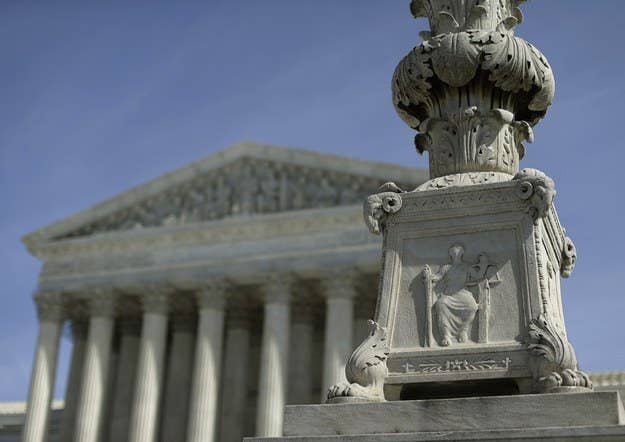
When Bill Phillips, an adviser to national Democratic donors, heard about the Supreme Court decision to lift limits on aggregate campaign finance contributions, he knew his clients had lost something special: the easy way to say no.
"There are inevitably a number of candidates who will come to a donor looking for financial support," said Phillips, a Florida consultant who represents several members of the progressive network, the Democracy Alliance. "And now, that donor can no longer say, 'Sorry, but I'm already maxed out this cycle.'"
"Now that answer just has to be no," he said.
Phillips was not alone. After the Supreme Court ruled on Wednesday morning to overturn what's called the "aggregate limit" on political giving — an overall cap on how much money one individual may donate to campaigns and party committees in one election cycle — donor advisers and strategists said high-dollar contributors will now be expected to give to more candidates than ever before.
The aggregate limit, struck down in the ruling on McCutcheon v. Federal Election Commission, would have been $123,200 this year. Shaun McCutcheon, the Alabama businessman behind the case, challenged the cap, arguing that individuals should be able to make the maximum contribution to as many campaigns and party committees as they like. Now, one single donor could "max out" to every candidate for the Senate, every candidate for the House of Representatives, every political action committee, and every state and federal party committee.
As one Democratic fundraiser put it, "So many people were in the business of tracking aggregate limits. And today thousands of spreadsheets are being deleted."
Fundraisers, particularly for the party committees, which once had to compete for a limited amount of money every two years, are sure to be thrilled. But the court's decision does upend the dynamic between campaigns and the small group of the very rich who fund them — donors who regularly hit the aggregate limit each cycle.
"Many times I find myself saying to candidates, 'I am sorry but my client is federally maxed out,'" said Marge Tabankin, a veteran political adviser based in California. "That excuse for these donors is gone, and some people aren't going to be happy."
"But for the people who do want to give more, the door is now wide open," said Tabankin, whose clients include singer Barbara Streisand.
"It does take away their best excuse," said Justin Buell, a San Francisco political consultant with clients who have typically reached the aggregate limit each cycle, including billionaire Tom Steyer, one of the Democratic Party's biggest donors.
When the McCutcheon decision came down on Wednesday morning, Buell emailed his clients with details of the ruling, promising to review their individual portfolios. One messaged back: The court was "taking us in the same direction as Citizens United," the client argued, referring to the 2010 Supreme Court case that made it possible for super PACs to solicit unlimited, undisclosed amounts of money.
But the McCutcheon decision also steers money from those organizations — super PACs and nonprofits with a 501c4 tax status — by likely directing checks back to campaigns and the three federal committees in each party. "This allows donors to put a little bit of money in a lot of different races" and avoid "backchannels," Buell said. "It will actually reduce their spending on super PACs."
The three party committees on each side stand to benefit perhaps most of all. For the first time, donors may contribute the maximum amount allowed to each — $32,400 — to all three entities. The court decision ends what one political fundraiser described as a "private battle" between the groups to "get donor maxes."
Matt Canter, deputy executive director for the Democratic Senatorial Campaign Committee, described the ruling as "a win for national party committees."
The case is likely to boost funding for state parties, too. "With the aggregate limits struck down, it will hopefully help to sort of reinvigorate the state party committee structures for both parties," said Jason Torchinsky, an attorney at Holtzman Vogel Josefiak, a firm that provides counseling to PACs and candidates.
But many eye the ruling as just one thing: a window for even greater influence of money in politics. While the Republican National Committee, which funded McCutcheon's constitutional challenge, paraded the Supreme Court decision on Wednesday, Democratic lawmakers released statements condemning the decision as an extension of the Citizens United v. FEC case.
Tara Malloy, senior counsel at the Campaign Legal Center, said the ruling would only amplify the political "arms race." According to the legal center's calculations, a single donor could now contribute a total of more than $2.4 million collectively in House and Senate races, based on a total of 468 federal elections per cycle.
"These are huge sums which any common sense understanding would see leading to the purchase of possible influence and leading to corruption," Malloy said.
Phillips, the Florida donor adviser, said he spent Wednesday telling his clients that the McCutcheon decision makes clear "that money equals speech."
"What I'm telling them today is that the court has made that clear," Phillips said. "While we may have a philosophical or moral objection to the amount of money in politics, the debate has shifted. Folks who have this concern need to focus more on disclosure and transparency than fighting the notion of money as speech."

